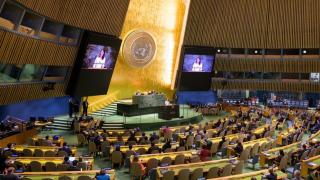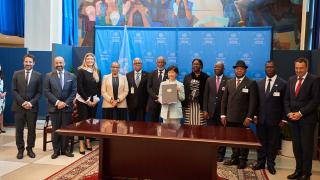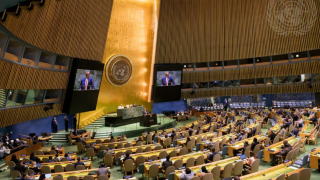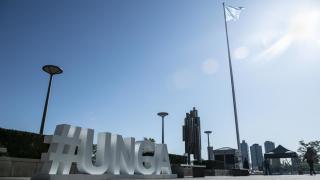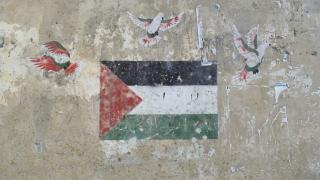
In July, UNA-UK coordinated a letter from over 50 former senior British diplomats and UN officials calling on the Prime Minister to recognise the State of Palestine unconditionally.
The letter stated that the continuation of Palestinian life in the Occupied Palestinian Territories is under an unprecedented level of threat, to the point where the risks of inaction have profound, historic and catastrophic implications. It said that Israel has also been affected by the violent and criminal actions of Hamas militants resisting the occupation and cannot be secure from threats in the future if the question of Palestine is not taken forward to a political settlement.
Many of our members and supporters wrote to their MPs to join this call, as part of many around the country who spoke up on this issue before the government decided that it would proceed with recognition this September. Some of you also wrote to us with questions, and we have drawn on those as we compiled this briefing and FAQ for further background and context.
Briefing
This week, the UK will recognise the State of Palestine, along with France, Canada, Australia, Belgium, Luxembourg, New Zealand and Portugal. They join 147 of the 193 UN member states, representing over 75% of UN members, and now four out of five permanent members of the UN Security Council. This widespread recognition underscores a global consensus supporting Palestinian sovereignty and self-determination, in the context of providing security and rights both for Israelis and for Palestinians.
Yet this moment of recognition will hardly be celebratory. It comes as the foundations of Palestinian life in Gaza are being wiped out by Israel’s ongoing assault and siege. The UN Independent Commission of Inquiry has found that Israel is committing genocide in Gaza, with its actions constituting four out of the five prohibited crimes under the Genocide Convention. The UN has confirmed there is a widespread, “entirely man-made” famine in Gaza. Volker Türk, UN High Commissioner for Human Rights, has stated this famine “is the direct result of actions taken by the Israeli Government.” In the West Bank, Israeli settlers are stepping up violent attacks on Palestinians and Israeli ministers are threatening the possibility of formal annexation while also giving the go-ahead for a settlement that would cut the West Bank in two.
There is growing international condemnation of Israel’s actions, including from longstanding partners of Israel who initially backed its war in Gaza after the Hamas massacres and hostage-taking of 7th October, and every living former head of the Israeli intelligence and security services has now called for the war to end. There is also extensive international and regional support for a ceasefire that would free the Israeli hostages and Palestinian prisoners in Israel, and would include the withdrawal of Israeli troops and restoration of Palestinian Authority (PA) rule in Gaza, with Hamas handing over its weapons to the PA while the PA would commit to elections. This path forward is set out in the New York Declaration signed by European and Arab states at the UN conference on Palestine in July, and endorsed by 142 countries in a General Assembly resolution on 12 September.
However, the US continues to block the international consensus: last week, for the sixth time, it vetoed a UN Security Council resolution that called for a ceasefire along with the release of the Israeli hostages. As a result, there is – once again - paralysis in the world’s top body charged with maintaining international peace and security. That has prompted an examination of what the UN General Assembly may be able to do, with Colombia now calling for a UNGA-mandated international peacekeeping force for Gaza.
Frequently asked questions
Who would govern a Palestinian state?
It is states, rather than governments, who are recognised at the UN. The body that represents Palestine at the UN, currently as a non-member observer, is the Palestine Liberation Organisation (PLO). It maintains diplomatic missions, joins bodies such as UNESCO and the International Criminal Court, and participating actively in global diplomacy, for instance through "The Permanent Observer Mission of the State of Palestine to the United Nations". Currently, Hamas is not part of the PLO and the Palestinian president has emphasised that to be included in the PLO the group would need to commit to the Organisation’s existing international commitments. These include the recognition of Israel and the commitment to a two-state solution in line with UN resolutions.
What would the borders be?
The Palestinian Territory, although under occupation, is internationally recognised in UN resolutions as the foundation for a sovereign state based on 1967 borders. The International Court of Justice (ICJ), in its 2004 advisory opinion on the separation barrier, affirmed that the West Bank, including East Jerusalem, and the Gaza Strip constitute a single territorial unit, reinforcing the legal coherence of Palestinian statehood. In its 2024 advisory opinion, the ICJ ruled the Israeli occupation of the Occupied Palestinian Territory to be unlawful, noting, among other things, the prohibition on acquiring territory by force.
Previous peace negotiations have generally assumed that the borders of a future Palestinian state would be based on 1967 borders, while not ruling out the potential for land swaps to be agreed in negotiations (a possibility also noted in the 2024 ICJ opinion). In the meantime, neither the State of Israel or the State of Palestine has fully defined borders. The lack of fully defined borders has not been a barrier to recognition of the State of Israel.
Will it mean anything in reality? Why prioritise this when the situation on the ground is so urgent?
The recognition of Palestinian statehood is a political and legal declaration, which helps to set parameters for the future, with ongoing political and legal implications for policy by the states that have recognised, for international processes in which they participate, and for any future peace processes. The recognition of Palestine as an observer (and not yet a member) at the UN since 2012 has already made it possible for the ICC to investigate war crimes there – and to issue warrants for the arrest of Israeli leaders as well as members of Hamas.
The extent to which the recognition of Palestine translates into changes on the ground will depend on it being linked to other short, medium and long term measures to end the onslaught on Gaza, stop annexation of the West Bank and ultimately to prevent genocide.
Is there really hope for a two-state solution?
The concept of the two-state solution is based on the principles that the two peoples, Israelis and Palestinians, have equal rights to sovereignty and independence, and that the route to achieve this is through partition into two separate states. This is the option that has had the greatest international consensus – although the credibility of the two-state solution has suffered over the years as there have been no serious attempts to implement it while “facts on the ground” have moved in the opposite direction. However, the efforts to resurrect the two-state solution reflect a fear that the most likely alternative scenario is some combination of annexation and expulsion.
Looking to the longer term, Israelis and Palestinians interested in peace have developed a variety of proposals for sharing the land: ideas that have been floated include a one-state solution based on equal rights (which some formulate as a binational state), or a confederation such as the Holy Land Confederation, or Two States, One Homeland. Recognising the State of Palestine will influence the parameters of any future negotiation or settlement by sending the political message that Israel does not have a veto over the Palestinian right to statehood.
Are there legal barriers to recognition?
The then UK Foreign Secretary, William Hague acknowledged Palestine largely meets standards of statehood in 2011.
The Palestinian people’s right to self-determination is firmly established in international law and repeatedly reaffirmed by the United Nations. The UN Charter enshrines self-determination as a foundational principle (Article 1(2)), while both 1966 International Covenants on human rights state unequivocally that “all peoples” enjoy this right. The UN General Assembly, through Resolution 3236 (1974), explicitly recognised the inalienable rights of the Palestinian people, including self-determination, independence and sovereignty.
More recently, Resolution 67/19 (2012) upgraded Palestine’s status to “non-member observer State,” reflecting broad recognition of its legitimate statehood aspirations. Together, these resolutions confirm that Palestinian self-determination is not conditional, but a legal and political imperative central to any lasting peace.
Read more:
- Statements from the Elders on recognising Palestinian statehood, Palestinian self-determination, and a two-state solution
- International Crisis Group statement ‘The World’s Shame in Gaza’
- Information on the UN High-level Conference on a two-state solution
- Action on Armed Violence report on the civilian death toll in Gaza
- Just Security article ‘From Peacekeepers to Naval Convoys: Weighing the Options (and Legal Limits) on More Concerted General Assembly Action on Gaza’
- Essay in the Cairo Review of Global Affairs 'What Palestinian Statehood Must Mean to Mean Anything’
- Prospect magazine article ‘The problem with recognising Palestine’
Photo: Palestinian flag and peace dove street art. Credit: Ash Hayes on Unsplash.

